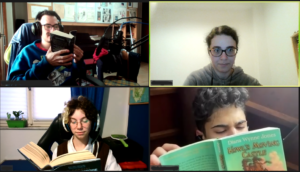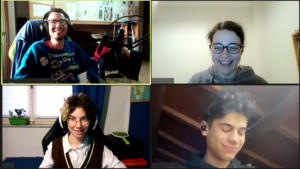
How to set it up?
It depends on the game we are going to play and its purpose. If we just want to split two heavy activities with something more easygoing and we don’t want to hide it, it can be as easy as just saying, Let’s play a game! Otherwise, we can start facilitating a discussion to introduce a game during a discussion or just as it ends. Of course, if we want to play a game that requires installation, it’s better to have it installed and tested before our session starts, and if the game requires physical materials, it’s a good idea to have everything ready, especially if the participants need to have some materials as well.
By being a little smart, it will be very easy to use most of these games as a link to our following activity, as long as we keep that in mind.
Most games don’t have a recommended number of players. It’s up to us to decide whenever we think it’s best to divide the group into smaller sections.
What are good practice examples?
1.) Games that can be played simply by being on a video call
One Word Guess: It can be played as a collaborative game or in teams. One participant (for each team) needs to guess a selected word. The other participants (of the same team) can only secretly choose a single word each to give the guesser as a suggestion. The catch is that if two participants choose the same word by chance, both suggestions will be deleted and unavailable for the guesser. The latter has a single chance to guess the word. Guessing correctly brings a +1 point, while making a mistake is a -1 point penalty. Giving up on guessing maintains a flat 0 points. The game can end after a specific amount of words or as a specific score is met.
 Quick Research: We make everyone take a book. When everyone is ready, we say (or write down) a word, line, and page number. For example, 3rd word, 5th line, page 15, in this order. We invite the participants to find the required word as soon as possible. We are going to hear the words from a few. After a couple of rounds, participants should feel more energetic, and we will have a collection of random words that can be used for any activity or just as a display for the participants.
Quick Research: We make everyone take a book. When everyone is ready, we say (or write down) a word, line, and page number. For example, 3rd word, 5th line, page 15, in this order. We invite the participants to find the required word as soon as possible. We are going to hear the words from a few. After a couple of rounds, participants should feel more energetic, and we will have a collection of random words that can be used for any activity or just as a display for the participants.
Treasure Hunt: We choose an item, and everyone should hurry to find it as soon as possible. We can declare a specific item (like a pillow) or something more generic (like something starting with R or something blue). It would be even greater if we manage to connect this energizer to our next activity by choosing the proper items (for example, a book, if the goal is to play Quick Research next, or maybe something typical of your country, or something that makes you feel a specific emotion).
Definition Making: We provide one or more words that do not exist. Each participant (or group) will get some time to try defining such words. The results can then be discussed. It’s good to tie the made-up words to whatever activity needs to be done next.
Item Story Extension: We make everyone grab a random item (maybe by playing another game, like Treasure Hunt). We start a story, then each participant will take a turn to make up how the story continues, using the item as inspiration until a natural conclusion is reached, making sure that everyone had at least one chance to add their part to the story.
 Smile Counting: In this game, everyone starts counting seconds, trying not to laugh. Online, though, the delay from each person is inevitable, easily creating a fun mess.
Smile Counting: In this game, everyone starts counting seconds, trying not to laugh. Online, though, the delay from each person is inevitable, easily creating a fun mess.
Spot the Difference: We take two pictures of our same room, creating a difference between the two (maybe by moving an object). After uploading both pictures in the chat, the participants will need to spot the difference(s). Let’s not make it too hard, and then give the participants the chance to take the picture themselves so that they can show their room to the others. If we want to, we can quickly close the activity by taking the picture again, creating a difference so big and obvious that everyone will be taken by surprise.
2.) Games that require specific software
Many games and small activities can be prepared and created in the online environment. While some are adaptations of pre-existing activities, others take direct advantage of the participants being on the call. Sometimes, though, it’s nice to have something more structured to rely on. Many applications, such as Zoom and Discord, already provide games to be played on their platform. When those options are not available (or not enough), our main suggestion would be Gartic Phone. The base idea of the game is similar to Pictionary, which can be scary for some people, but the concept is twisted enough to work wonders even (if not especially) for those who are not good at drawing. I personally played with a group of professional animators and had fun, regardless!
If we are searching for games in a more traditional sense, there is always a free selection of online board games available at Board Games Arena.
Finally, it’s possible to play some video games together, which sometimes can be found for free for everyone on the most famous platforms such as Steam and Epic Game Store. With the proper organization, I’m betting it can be very fun to organize a session together in the free video game VR Chat.
